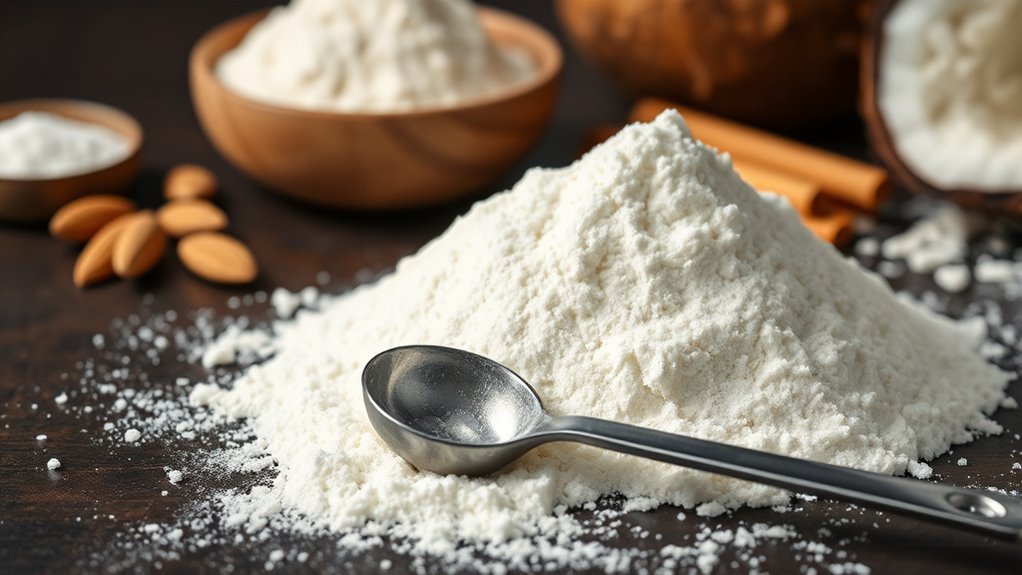Rice flour isn’t keto-friendly due to its high carbohydrate content, containing about 80 grams of carbs per 100 grams. This can easily disrupt ketosis, as consuming it in excess may lead your body to burn glucose instead of fat. While it’s gluten-free and has a mild flavor, moderation is key. You might consider low-carb alternatives like almond or coconut flour that fit better with keto goals. Learn more about incorporating rice flour in your diet effectively.
Understanding Rice Flour’s Nutritional Profile

Understanding rice flour’s nutritional profile is essential for anyone contemplating a keto diet. Rice flour offers several benefits, including being gluten-free, which makes it a great alternative for those with sensitivities. Its mild flavor can enhance various recipes and provide a desirable texture. However, there are drawbacks to weigh. While rice flour is rich in carbohydrates, it can hinder your ketosis goals if consumed in excess. Additionally, it lacks some essential nutrients found in whole grains. Balancing your intake is key; you may find incorporating rice flour in moderation allows you to enjoy its benefits while minimizing the drawbacks. Ultimately, staying informed about its nutritional profile will empower you to make choices that align with your dietary freedom.
The Carbohydrate Content of Rice Flour

Although rice flour can be a versatile ingredient in many recipes, its carbohydrate content is an important factor to keep in mind for those on a keto diet. With around 80 grams of carbs per 100 grams, rice flour is a high-carb ingredient compared to other flour substitutes. When you’re looking for low-carb carbohydrate sources, it’s vital to explore alternatives such as almond or coconut flour. Here’s a quick comparison of different flours:
| Flour Type | Carbohydrates (per 100g) |
|---|---|
| Rice Flour | 80g |
| Almond Flour | 20g |
| Coconut Flour | 21g |
| Wheat Flour | 76g |
| Oat Flour | 66g |
Choosing the right flour can help you stay aligned with your dietary goals.
How Rice Flour Affects Ketosis

When you’re on a keto diet, the impact of consuming rice flour on ketosis can be significant due to its high carbohydrate content. Each serving can easily exceed your daily carb limit, hindering your ability to maintain ketosis. This means that regular consumption might cause your body to switch back to burning glucose for energy rather than fat, which is counterproductive for your goals. Understanding the ketosis impacts of rice flour can help you make informed choices. If you’re looking for options that align better with your keto lifestyle, consider rice flour alternatives like almond flour or coconut flour, which provide lower carbohydrate counts. These alternatives can help you stay in ketosis while enjoying a variety of delicious meals.
Keto-Friendly Alternatives to Rice Flour
If you’re looking for keto-friendly alternatives to rice flour, you’re in luck; there are several options that can satisfy your baking and cooking needs without derailing your diet. Almond flour is a popular choice, as it’s low in carbs while offering a nutty flavor and moist texture. It works well in baked goods and can be used for breading meats. Coconut flour is another excellent alternative; it’s higher in fiber, which can help you feel full longer. However, it absorbs more moisture, so adjustments in liquid ingredients may be necessary. Both options provide versatility in your keto cooking, allowing you to enjoy your favorite recipes while adhering to a low-carb lifestyle.
Incorporating Rice Flour Into a Keto Diet: Tips and Considerations
While almond and coconut flours are popular choices for those on a keto diet, some might wonder about the role of rice flour in their meal planning. If you’re considering substituting rice flour, it’s essential to understand its higher carb content. However, you can use it sparingly as part of your overall macro balance. When incorporating rice flour, consider blending it with low-carb alternatives to reduce net carbs. Experimenting with baking strategies, such as creating a mix of almond flour and rice flour, can yield satisfying textures without sacrificing flavor. Always monitor your carb intake and adjust portion sizes accordingly. Remember, the key to a successful keto diet is flexibility, so find what works best for you and enjoy the freedom of variety.
Frequently Asked Questions
Can I Use Rice Flour in Keto Desserts?
You can’t use rice flour in keto desserts if you’re aiming to stay within strict carb limits. Rice flour is high in carbohydrates, which can hinder your keto goals. Instead, consider dessert alternatives like almond flour or coconut flour, which are much lower in carbs and suitable for keto baking. These options can help you enjoy sweet treats without compromising your diet, allowing for creative freedom in the kitchen while keeping your carb intake in check.
Is Rice Flour Gluten-Free?
Yes, rice flour is gluten-free, making it a great option for those with gluten sensitivity. It’s derived from finely milled rice, which doesn’t contain gluten, unlike wheat flour. This means you can enjoy it in various recipes without worrying about gluten-related issues. However, always check product labels, as cross-contamination can occur in some facilities. Opt for certified gluten-free rice flour if you’re particularly sensitive, ensuring a safe and enjoyable baking experience.
How Does Rice Flour Compare to Almond Flour?
Rice flour has about 150 calories per 1/4 cup, while almond flour packs about 170 calories for the same serving. Regarding nutrition, rice flour is lower in protein but higher in carbs, making it less favorable for low-carb diets. On the other hand, almond flour benefits from healthy fats and more protein, offering better satiety. So, if you’re looking for a nutritious alternative, almond flour is often the better choice.
Can Rice Flour Cause Weight Gain on Keto?
Yes, rice flour can potentially contribute to weight gain on a keto diet. It’s higher in carbohydrates compared to other flours, which can disrupt ketosis. If you’re aiming to maintain a low-carb intake, incorporating rice flour might lead to excess calorie consumption, ultimately affecting your weight. You’ll want to monitor your carb intake carefully to stay within your goals. Balancing your choices can help you enjoy food while still pursuing your keto lifestyle.
Are There Any Health Benefits to Rice Flour?
Rice flour can offer some health benefits, like being gluten-free, which appeals to many with gluten sensitivities. Notably, about 1 in 100 people have celiac disease, making gluten-free options essential. Its nutritional profile includes carbohydrates, some protein, and essential minerals. However, keep in mind that rice flour can contain potential allergens, so it’s important to read labels. When used in moderation, it can be a useful addition to your diet.
Frequently Asked Questions about Rice Flour and Keto
1. Is rice flour keto-friendly?
Rice flour is generally not considered keto-friendly due to its high carbohydrate content. A typical serving contains around 45 grams of carbs per 100 grams, which is significantly higher than the recommended daily carb intake for a ketogenic diet, typically limited to about 20-50 grams of net carbs per day.
2. What are the alternatives to rice flour for a keto diet?
For those following a keto diet, alternatives to rice flour include almond flour, coconut flour, and flaxseed meal. These options are lower in carbs and higher in healthy fats and fiber, making them more suitable for keto baking and cooking.
3. Can I use rice flour in moderation on a keto diet?
While it is possible to use rice flour in moderation, it is crucial to monitor your overall carbohydrate intake. If you choose to include it, be mindful of portion sizes and ensure that it fits within your daily carb limits. It may be more appropriate for those who are in a targeted or cyclical keto diet rather than a strict ketogenic approach.
4. What is the nutritional profile of rice flour?
Rice flour is primarily composed of carbohydrates, with a small amount of protein and minimal fat. On average, it contains about 80% carbohydrates, 6% protein, and less than 1% fat. It also provides some B vitamins and minerals, but due to its high carb content, it is not ideal for a ketogenic diet.
5. Can rice flour be used in keto-friendly recipes?
While rice flour is not keto-friendly, it can sometimes be used in very small quantities within recipes designed for a low-carb diet. However, it’s often recommended to substitute rice flour with low-carb alternatives like almond or coconut flour to create more keto-friendly dishes without compromising on taste or texture.
References
- https://www.ncbi.nlm.nih.gov/pmc/articles/PMC6313448/
- https://www.healthline.com/nutrition/keto-diet-foods
- https://www.webmd.com/diet/obesity/what-is-the-keto-diet
- https://www.wisewell.com/blogs/news/what-is-the-keto-diet
- https://www.bbcgoodfood.com/howto/guide/what-keto-diet
- https://www.ncbi.nlm.nih.gov/pmc/articles/PMC6551239/
- https://www.mayoclinic.org/healthy-lifestyle/nutrition-and-healthy-eating/expert-answers/keto-diet/faq-20402867


